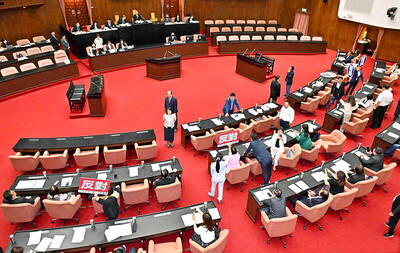The Democratic Progressive Party (DPP) yesterday accused the Ministry of Economic Affairs (MOEA) of tampering with an impact assessment report on signing an economic cooperation framework agreement (ECFA) with China, saying the ministry had deflated potential job losses that could follow the trade deal's implementation.
Speaking at a DPP-hosted press conference, Taiwan Thinktank chairman Chen Po-chih (陳博志), who formerly served as chairman of the Council for Economic Planning and Development (CEPD), said the ministry had fabricated the numbers in a report claiming that an ECFA would boost GDP and create jobs.
Chen said the report, which was conducted by the Chung-Hua Institution for Economic Research for the ministry, based its calculations on two contradictory scenarios — full employment and serious unemployment.
The MOEA tampered with the concluding figures in the report by “adjusting” the formulas, he said.
Chen added that during a “state affairs forum” in April, he asked Minister of Economic Affairs Yiin Chii-ming (尹啟銘) about the negative effects an ECFA would have on Taiwanese industries.
Chen said the minister did not dare state that the trade pact would pose zero harm to local industries, but only said it was vital for Taiwan to sign the deal with Beijing.
Yiin probably already knew of the ECFA's adverse effects, but purposely concealed it from the public, Chen said. He urged the Control Yuan to investigate the ministry and Yiin for possible malfeasance.
DPP Spokesman Cheng Wen-tsang (鄭文燦) panned the government for lying to the public by having the MOEA tweak the analysis report.
In response, the ministry issued a statement last night saying that it had “adjusted the figures to better reflect reality in its assessment.”
At a separate setting, the DPP yesterday warned that China could sneak in unification rhetoric in the planned trade agreement, and Taiwan could end up being trapped in the “one China” framework
The DPP made the remarks in the wake of President Ma Ying-jeou's (馬英九) statement on Wednesday that the ECFA would not include politically sensitive language.
Ma said his administration would expedite the signing of the agreement and promised that it would not contain terms such as “one China,” “peaceful unification” “or “one country, two systems.”
“We are highly doubtful of his promise. Even if these terms do not appear in the document, Beijing would find a way to sneak in its political agenda,” DPP Spokesman Cheng Wen-tsang (鄭文燦) said.
The absence of these controversial phrases is not a guarantee that the trade pact would be signed outside of Beijing's “one China” framework, Cheng said.
China has in the past few months made several demands to bring the Ma government to its knees, Cheng said, such as demanding that Taiwan open up direct flights across the median line of the Taiwan Strait.
The median line is an imaginary line of defense in the Taiwan Strait that was drawn up by the US.
Although the Ma administration has rejected the request, Beijing is unlikely to keep catering to Taipei's wishes, Cheng said, adding that the trade pact would pave the way for China to introduce political issues into the agreement.
The Taiwan Solidarity Union (TSU) also warned the government yesterday that inking an ECFA with China would be economic and political suicide for Taiwan.
TSU Chairman Huang Kuan-huei (黃昆輝) said signing an ECFA with China would be like putting all eggs in one basket by tying Taiwan's economy to a single market — China — instead of expanding its focus to cover the world markets.

NO-LIMITS PARTNERSHIP: ‘The bottom line’ is that if the US were to have a conflict with China or Russia it would likely open up a second front with the other, a US senator said Beijing and Moscow could cooperate in a conflict over Taiwan, the top US intelligence chief told the US Senate this week. “We see China and Russia, for the first time, exercising together in relation to Taiwan and recognizing that this is a place where China definitely wants Russia to be working with them, and we see no reason why they wouldn’t,” US Director of National Intelligence Avril Haines told a US Senate Committee on Armed Services hearing on Thursday. US Senator Mike Rounds asked Haines about such a potential scenario. He also asked US Defense Intelligence Agency Director Lieutenant General Jeffrey Kruse

INSPIRING: Taiwan has been a model in the Asia-Pacific region with its democratic transition, free and fair elections and open society, the vice president-elect said Taiwan can play a leadership role in the Asia-Pacific region, vice president-elect Hsiao Bi-khim (蕭美琴) told a forum in Taipei yesterday, highlighting the nation’s resilience in the face of geopolitical challenges. “Not only can Taiwan help, but Taiwan can lead ... not only can Taiwan play a leadership role, but Taiwan’s leadership is important to the world,” Hsiao told the annual forum hosted by the Center for Asia-Pacific Resilience and Innovation think tank. Hsiao thanked Taiwan’s international friends for their long-term support, citing the example of US President Joe Biden last month signing into law a bill to provide aid to Taiwan,

China’s intrusive and territorial claims in the Indo-Pacific region are “illegal, coercive, aggressive and deceptive,” new US Indo-Pacific Commander Admiral Samuel Paparo said on Friday, adding that he would continue working with allies and partners to keep the area free and open. Paparo made the remarks at a change-of-command ceremony at Joint Base Pearl Harbor-Hickam in Hawaii, where he took over the command from Admiral John Aquilino. “Our world faces a complex problem set in the troubling actions of the People’s Republic of China [PRC] and its rapid buildup of forces. We must be ready to answer the PRC’s increasingly intrusive and

STATE OF THE NATION: The legislature should invite the president to deliver an address every year, the TPP said, adding that Lai should also have to answer legislators’ questions The Chinese Nationalist Party (KMT) yesterday proposed inviting president-elect William Lai (賴清德) to make a historic first state of the nation address at the legislature following his inauguration on May 20. Lai is expected to face many domestic and international challenges, and should clarify his intended policies with the public’s representatives, KMT caucus secretary-general Hung Meng-kai (洪孟楷) said when making the proposal at a meeting of the legislature’s Procedure Committee. The committee voted to add the item to the agenda for Friday, along with another similar proposal put forward by the Taiwan People’s Party (TPP). The invitation is in line with Article 15-2